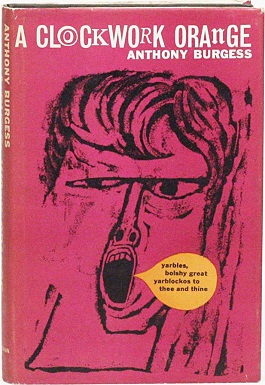
A Clockwork Orange is a dystopian satirical black comedy novella by English writer Anthony Burgess, published in 1962. It is set in a near-future society that has a youth subculture of extreme violence. The teenage protagonist, Alex, narrates his violent exploits and his experiences with state authorities intent on reforming him. The book is partially written in a Russian-influenced argot called "Nadsat", which takes its name from the Russian suffix that is equivalent to '-teen' in English. According to Burgess, the novel was a jeu d'esprit written in just three weeks.

Big Brother is a character and symbol in George Orwell's dystopian 1949 novel Nineteen Eighty-Four. He is ostensibly the leader of Oceania, a totalitarian state wherein the ruling party, Ingsoc, wields total power "for its own sake" over the inhabitants.
Nadsat is a fictional register or argot used by the teenage gang members in Anthony Burgess's dystopian novel A Clockwork Orange. Burgess was a linguist and he used this background to depict his characters as speaking a form of Russian-influenced English. The name comes from the Russian suffix equivalent of -teen as in thirteen. Nadsat was also used in Stanley Kubrick's film adaptation of the book.

John Anthony Burgess Wilson, who published under the name Anthony Burgess, was a British writer and composer.

The Cambridge Five was a ring of spies in the United Kingdom that passed information to the Soviet Union during the Second World War and the Cold War and was active from the 1930s until at least the early 1950s. None of the known members were ever prosecuted for spying. The number and membership of the ring emerged slowly, from the 1950s onwards.
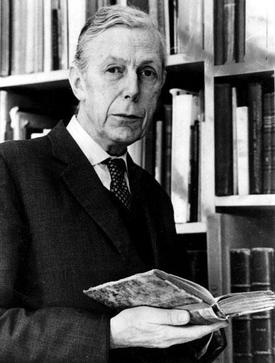
Anthony Frederick Blunt, styled Sir Anthony Blunt from 1956 to November 1979, was a leading British art historian and Soviet spy.

The Malay College Kuala Kangsar is a residential school in Malaysia. It is an all-boys and all-Malay school in the royal town of Kuala Kangsar, Perak. It is sometimes dubbed "the Eton College of the East".

Earthly Powers is a panoramic saga novel of the 20th century by Anthony Burgess first published in 1980. It begins with the "outrageously provocative" first sentence: "It was the afternoon of my eighty-first birthday, and I was in bed with my catamite when Ali announced that the archbishop had come to see me."
Fortunes of War is the name given to a series of six novels by Olivia Manning that describe the experiences of a young married couple early in World War II. The series is made up of two trilogies: the books The Great Fortune (1960), The Spoilt City (1962), and Friends and Heroes (1965) comprise The Balkan Trilogy, while The Danger Tree (1977), The Battle Lost and Won (1978), and The Sum of Things (1980) comprise The Levant Trilogy. The novels were based on Manning's personal experiences during the second world war.

1985 is a novel by English writer Anthony Burgess. Originally this book was published in 1978, it was inspired by, and was intended as a tribute to, George Orwell's novel Nineteen Eighty-Four. It was adapted by Guy Meredith as a radio play and broadcast on BBC Radio 3 on 23 January 1985.

The Centaur is a novel by John Updike, published by Alfred A. Knopf in 1963. It won the U.S. National Book Award for Fiction. Portions of the novel first appeared in Esquire and The New Yorker.
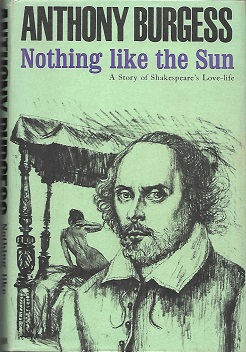
Nothing Like the Sun is a fictional biography of William Shakespeare by Anthony Burgess first published in 1964. It tells the story of Shakespeare's life with a mixture of fact and fiction, the latter including an affair with a black prostitute named Fatimah, who inspires the Dark Lady of the Sonnets. The title refers to the first line of Sonnet 130, "My mistress' eyes are nothing like the sun", in which Shakespeare describes his love for a dark-haired woman.
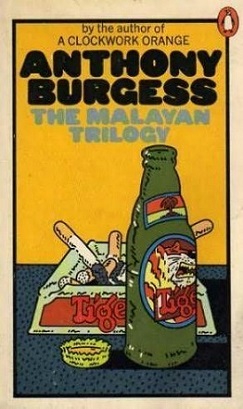
The Malayan Trilogy, also published as The Long Day Wanes: A Malayan Trilogy in the United States, is a comic 'triptych' of novels by Anthony Burgess set amidst the decolonisation of Malaya.

M/F is a 1971 novel by the English author Anthony Burgess. It was first published as MF by Jonathan Cape and Alfred A. Knopf; though M/F first appeared on the spine of Knopf's dust jacket. Burgess has called the novel a personal favourite of all his writings.

Tremor of Intent: An Eschatological Spy Novel (1966), by Anthony Burgess, is an English espionage novel.

One Hand Clapping is a 1961 work by Anthony Burgess published originally under the pseudonym Joseph Kell in the UK.

The Doctor Is Sick is a 1960 novel by Anthony Burgess.
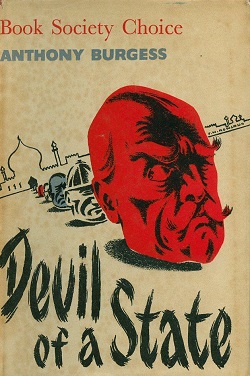
Devil of a State is a 1961 novel by Anthony Burgess based on his experience living and working in Bandar Seri Begawan, the capital of the Southeast Asian sultanate of Brunei, on the island of Borneo, in 1958–59.

The Right to an Answer is a darkly comic 1960 novel by Anthony Burgess, the first of his repatriate years (1960–69). One of its themes is the disillusionment of the returning exile. The critic William H. Pritchard described the novel in a 1966 publication as "surely Burgess's most engaging novel".
John Alan Patrick Lodwick was a British novelist.

















